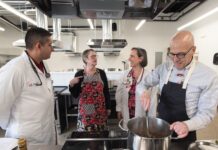
The Republic Bank Foundation Optimal Aging Clinic will use information gained from a collaboration between the University of Louisville Trager Institute and the UofL Logistics and Distribution Institute (LoDI) to safely resume in-person clinical services once COVID-19 positivity rates return to an acceptable level in the community. The institutes’ seemingly unusual collaboration will allow the clinic to create a safe environment for older adults to access the care they need during the COVID-19 pandemic. The Optimal Aging Clinic specializes in comprehensive care for older adults by taking an interdisciplinary approach to health care.
“It would be impossible for us to fulfill our mission of innovating the aging experience without first ensuring the safety and health of our older adult patients and staff during the pandemic,” said Anna Faul, executive director of the Trager Institute. “This partnership with LoDI has been beneficial for us to understand what we need to do to return to normal capacity when the positivity rates are at a level that would be absolutely safe for our patients and staff.”
Through the collaboration, LoDI and Trager Institute leaders established capacity and utilization estimates to allow Trager staff to transition from telehealth and work-from-home policies to hybrid policies allowing a return to in-clinic visits for patients and location-based work for Trager students, faculty and staff.
LoDI, housed at the UofL J.B. School of Engineering, is dedicated to developing innovative delivery processes for industries including manufacturing, service and health care. Students and faculty at LoDI recently worked with businesses in the oil and refinery field, a public utility and the Kentucky Humane Society.
For the project at the Trager Institute, a team led by Lihui Bai, co-director of LoDI, used a simulation model to determine a safe volume of traffic that allows proper social distancing at the Optimal Aging Clinic. In particular, the study team, which included Monica Gentili, Arsalan Paleshi and LoDI Fellow Shahab Sadri, simulated operations at the clinic to determine the maximum number of clinical staff, patients, faculty and students, as well as Trager faculty and staff, that safely could be present in the building.
The results of the study will serve as a guide for Trager Institute leadership in determining the percentage of clinic appointments that must be kept virtual and the number of learners and institute staff and faculty who safely could resume on-site activities. The clinic will implement the guidelines provided by the study once coronavirus infection rates in the community reach an acceptable level to resume in-person visits.
“Our study found that patient and staff movements at key common areas throughout the facility are within the safety measures of a COVID-19 environment,” Bai said. “We were happy to be a part of this collaboration by applying our simulation model to study the traffic patterns at the Optimal Aging Clinic. We look forward to extending this study to evaluate other operations measures such as utilization and possible improvements in a joint future research with the team at the Trager Institute.”
“We are grateful to the LoDI team for their expertise in helping us determine safe and efficient operating procedures at the clinic,” Faul said.
































